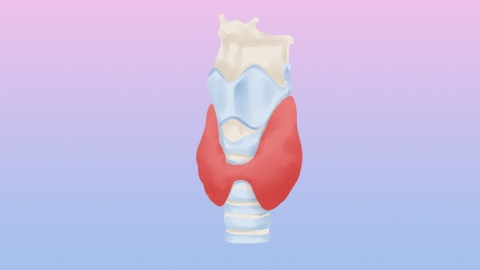What causes hyperthyroidism?
Hyperthyroidism refers to an overactive thyroid gland. This condition may be caused by abnormal iodine intake, autoimmune issues, excessive mental stress, toxic diffuse goiter, or autonomously functioning thyroid adenomas. Management depends on the specific circumstances. If discomfort occurs, it is recommended to seek timely medical consultation to clarify the condition and follow medical advice for treatment in order to avoid delaying the disease progression.

1. Abnormal iodine intake: Long-term excessive iodine intake, such as regularly consuming large amounts of iodine-rich foods like kelp and nori, can stimulate the thyroid gland to overproduce and secrete excessive thyroid hormones, leading to hyperthyroidism. Iodine intake should be appropriately controlled, avoiding excessive consumption of high-iodine foods, and iodized salt intake should also be moderate in daily diet.
2. Autoimmune issues: When the body's immune system mistakenly attacks the thyroid gland, thyroid-stimulating hormone receptor antibodies are produced, which stimulate the continuous secretion of excessive thyroid hormones. It is important to maintain a regular lifestyle, ensure adequate sleep, and engage in moderate exercise such as jogging or yoga to enhance immunity and regulate immune function.
3. Excessive mental stress: Prolonged high-pressure states and intense mental tension can interfere with the endocrine system, affecting the regulation of thyroid hormone secretion and promoting disease onset. Stress can be relieved through meditation, deep breathing, listening to music, etc., maintaining a calm mindset to stabilize the endocrine system.
4. Thyroiditis: This condition may be caused by infection, leading to inflammatory lesions in the thyroid tissue of patients, resulting in destruction of thyroid cells and release of large amounts of thyroid hormones into the bloodstream, thereby causing hyperthyroidism. It is recommended that patients follow medical guidance in using medications such as aspirin tablets, ibuprofen tablets, and thyroid tablets to alleviate symptoms.
5. Toxic diffuse goiter: This is an autoimmune disease wherein thyroid-stimulating hormone receptor antibodies produced by the body continuously stimulate the thyroid gland, causing diffuse enlargement and excessive secretion of thyroid hormones. Symptoms include goiter, exophthalmos, excessive sweating, palpitations, hand tremors, and irritability. Patients can follow medical guidance in using medications such as methimazole tablets, propylthiouracil tablets, and propranolol tablets to relieve discomfort.
In daily life, it is recommended to maintain good living and dietary habits, which can help reduce the risk of developing hyperthyroidism.







